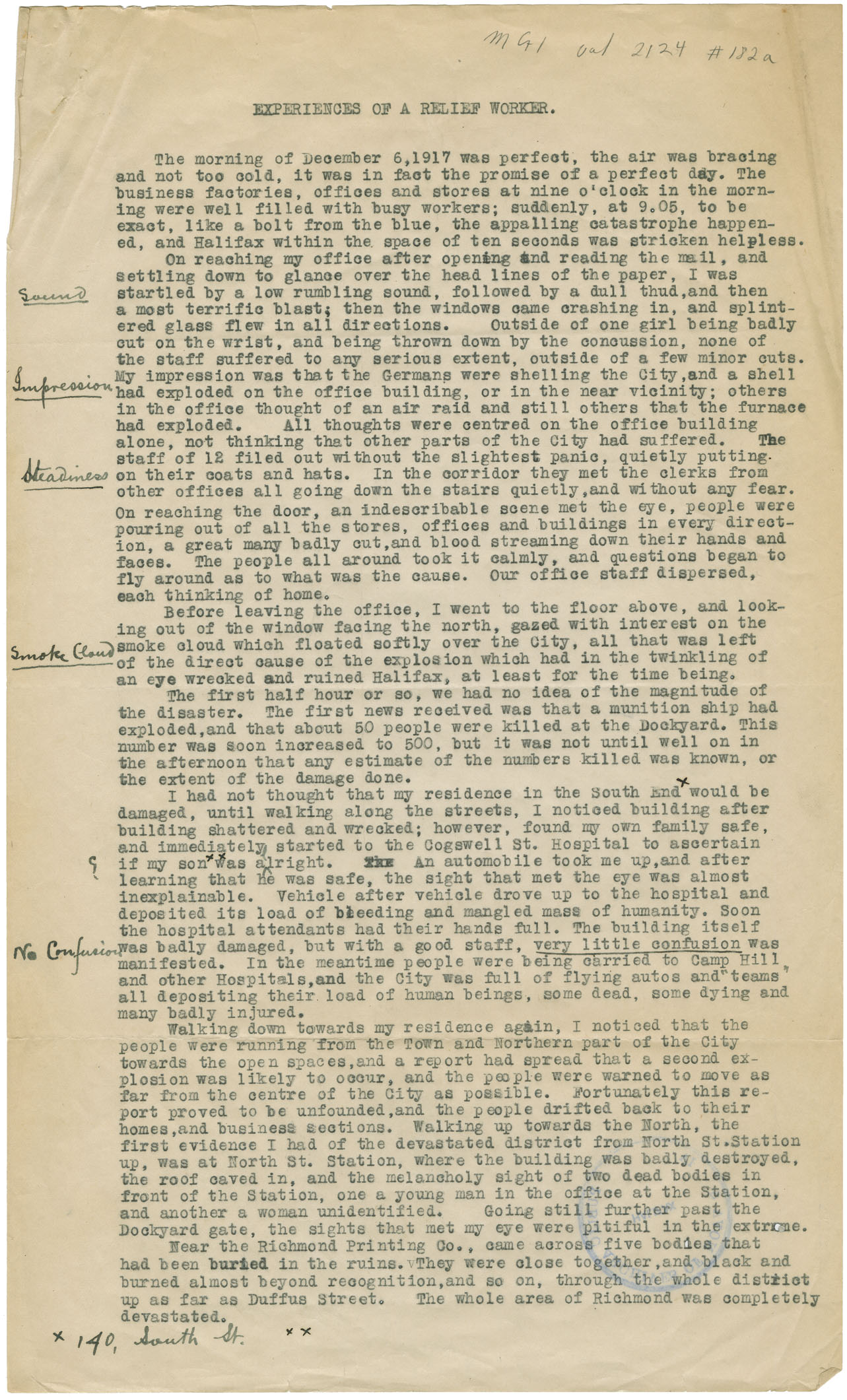Nova Scotia Archives
Archibald MacMechan
Halifax Disaster Record Office Materials
Personal narrative - Mr. W. A. Major
5 pages : 30 x 50 cm.
note: transcription publicly contributed - please contact us with comments, errors or omisions
MG 1 volume 2124 number 182a
EXPERIENCES OF A RELIEF WORKER.
The morning of December 6, 1917 was perfect, the air was bracing and not too cold, it was in fact the promise of a perfect day. The business factories, offices and stores at nine o'clock in the morning were well filled with busy workers; suddenly, at 9.05, to be exact, like a bolt from the blue, the appalling catastrophe happened, and Halifax within the space of ten seconds was stricken helpless.
On reaching my office after opening and reading the mail, and settling down to glance over the head lines of the paper, I was startled by a low rumbling sound, followed by a dull thud, and then a most terrific blast; then the windows came crashing in, and splintered glass flew in all directions. Outside of one girl being badly cut on the wrist, and being thrown down by the concussion, none of the staff suffered to any serious extent, outside of a few minor cuts. My impression was that the Germans were shelling the City, and a shell had exploded on the office building, or in the near vicinity; others in the office thought of an air raid and still others that the furnace had exploded. All thoughts were centred on the office building alone, not thinking that other parts of the City had suffered. The staff of 12 filed out without the slightest panic, quietly putting on their coats and hats. In the corridor they met the clerks from other offices all going down the stairs quietly, and without any fear. On reaching the door, an indescribable scene met the eye, people were pouring out of all the stores, offices and buildings in every direction, a great many badly cut, and blood streaming down their hands and faces. The people all around took it calmly, and questions began to fly around as to what was the cause. Our office staff dispersed, each thinking of home.
Before leaving the office, I went to the floor above, and looking out of the window facing the north, gazed with interest on the smoke cloud which floated softly over the City, all that was left of the direct cause of the explosion which had in the twinkling of an eye wrecked and ruined Halifax, at least for the time being.
The first half hour or so, we had no idea of the magnitude of the disaster. The first news received was that a munition ship had exploded, and that about 50 people were killed at the Dockyard. This number was soon increased to 500, but it was not until well on in the afternoon that any estimate of the numbers killed was known, or the extent of the damage done.
I had not thought that my residence in the South End would be damaged, until walking along the streets, I noticed building after building shattered and wrecked; however, found my own family safe, and immediately started to the Cogswell St. Hospital to ascertain if my son was alright. [xxx] An automobile took me up, and after learning that he was safe, the sight that met the eye was almost inexplainable. Vehicle after vehicle drove up to the hospital and deposited its load of bleeding and mangled mass of humanity. Soon the hospital attendants had their hands full. The building itself was badly damaged, but with a good staff, very little confusion was manifested. In the meantime people were being carried to Camp Hill, and other Hospitals, and the City was full of flying autos and teams all depositing their load of human beings, some dead, some dying and many badly injured.
Walking down towards my residence again, I noticed that the people were running from the Town and Northern part of the City towards the open spaces, and a report had spread that a second explosion was likely to occur, and the people were warned to move as far from the centre of the City as possible. Fortunately this report proved to be unfounded, and the people drifted back to their homes, and business sections. Walking up towards the North, the first evidence I had of the devastated district from North St. Station up, was at North St. Station, where the building was badly destroyed, the roof caved in, and the melancholy sight of two dead bodies in front of the Station, one a young man in the office at the Station and another a woman unidentified. Going still further past the Dockyard gate, the sights that met my eye were pitiful in the extreme.
Near the Richmond Printing Co., came across five bodies that had been buried in the ruins. They were close together, and black and burned almost beyond recognition, and so on, through the whole district up as far as Duffus Street. The whole area of Richmond was completely devastated.
[The words - Sound, Impression, Steadiness, Smoke Cloud, ?, No Confusion - are handwritten in the left margin of the page from top to bottom beside the respective paragraph describing each.]
x 140 South St. xx
States the case of Annie Campbell, also typed account 29 December 1917, by W. A. Major.
Reference: Archibald MacMechan Nova Scotia Archives MG 1 volume 2124 number 182

